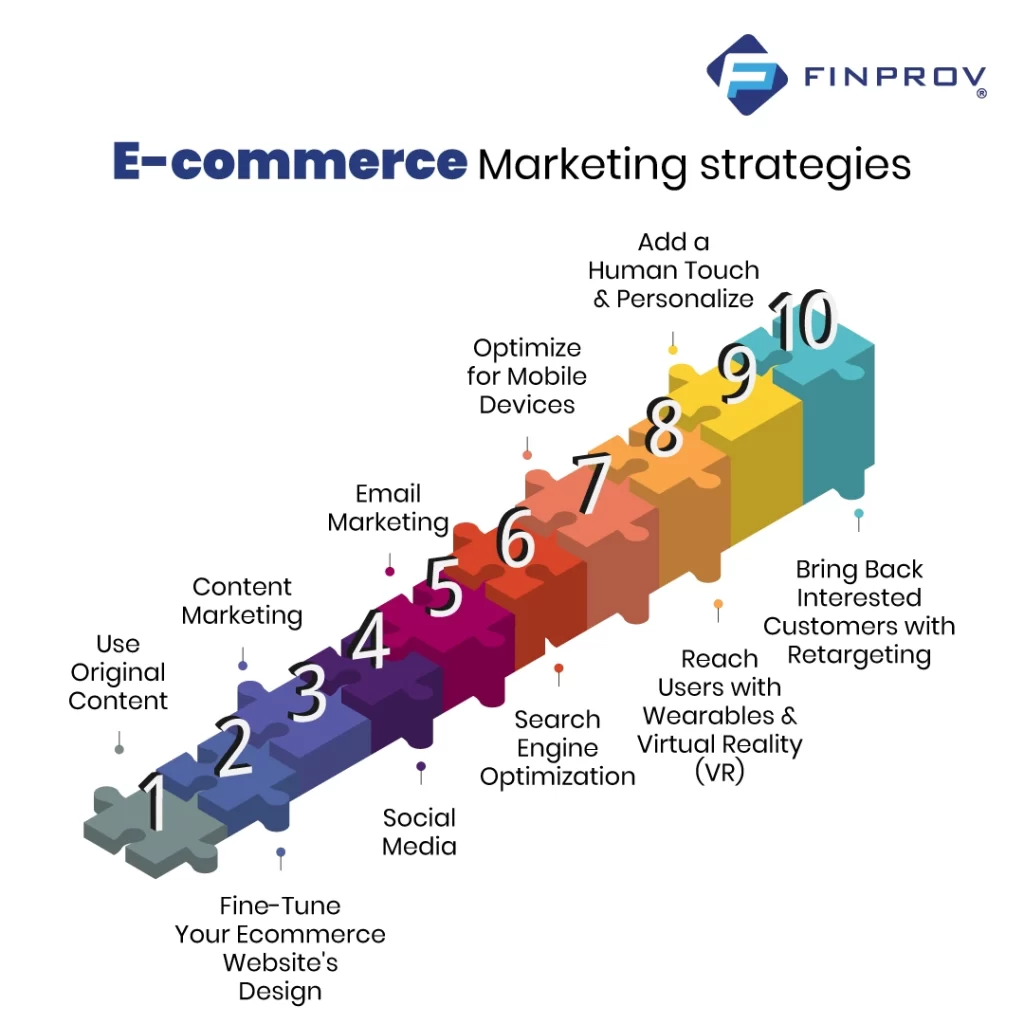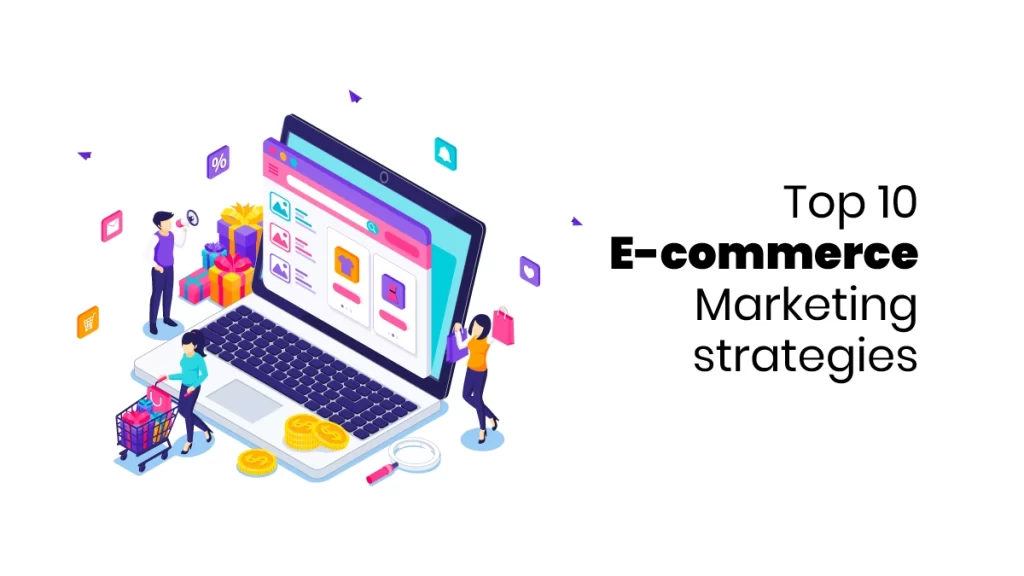If you love finding rare music or helping chefs with excellent kitchen tools, you will need more than your passion to bring you customers. But using proven e-commerce marketing strategies can. Learn about tools like email marketing, social media, text messages, and other tricks to see what works for your business. Use these tactics to turn your online store from an unknown to a popular shopping spot.
E-commerce marketing means using tactics to bring more visitors to your website and boost sales. The advantages are clear: it strengthens your brand, introduces you to new customers, and reconnects with those who already shop on your site.
Whether you use content marketing, social media, or user-generated content, you likely have various e-commerce marketing tools available. While each tool works well, effective e-commerce marketing combines different channels and messages to reach your audience where they are at the right time.
E-commerce Marketing Strategies

1. Use Original Content
The inaugural step in establishing an e-commerce website is crafting compelling and original content. High-quality and engaging material is crucial to success, resonating with customers, fostering interaction, driving purchases, and building a loyal following. Encourage creativity and originality to make a lasting impact, but tread carefully on the fine line between engaging and potentially deterring content.
If you’re stuck on what to write about, ask your customers. Use a tool that pops up and lets you chat with them. Ask things like:
- What are you trying to find?
- What do you want to know more about?
- Any questions on your mind?
- How did you end up here today?
The idea is to figure out what your audience is interested in because they’ll tell you. We’ll talk more about different types of content beyond the important “money pages” as we discuss content marketing.
2. Fine-Tune Your Ecommerce Website’s Design
After launching or updating your e-commerce website, it’s vital to check and improve its layout, language, and where conversion elements are placed. You aim to make it easy for customers to navigate, feel encouraged to buy, and understand how to do it.
Test the language on your landing and product pages, the wording in conversion elements, and where icons and elements are positioned. Use different testing methods to make sure your website is user-friendly. The aim is to optimize the design for a smooth and straightforward customer experience.
3. Content Marketing
Content marketing is a game-changer for e-commerce, capable of drawing positive attention, fostering interaction, and ensuring lasting conversions in a way that sets it apart from other marketing methods. When you create and share original content, you consistently provide your audience with meaningful information.
While website content covers areas like the home page, category pages, and product pages, content marketing takes a more focused approach. It’s crafted to attract and engage customers and strategically promoted to capture their attention and drive meaningful interactions.
Work collaboratively with your team to brainstorm and compile a list of content types you want to produce, ranging from blog posts and videos to newsletters. Optimize your marketing budget by consulting experts, outsourcing tasks when necessary, and investing in top-notch software, subscriptions, employee training, and other essential resources. This comprehensive strategy ensures the effectiveness of your content marketing efforts.
4. Social Media
Using social media is a great way to promote your e-commerce business. It helps you connect with your industry, customers, and market personally. Being active on social media allows you to interact with people, make your brand more known, bring visitors to your website, and grow your customer base. Platforms like Instagram Shop or Facebook Shop even let you sell directly without sending users elsewhere.
Using different social media platforms for specific purposes makes your online presence more interesting, expanding what your business can do. This helps you meet your customers’ needs and gradually grow your business.
5. Email Marketing
In the realm of customer outreach, email marketing is the most effective channel. The enduring success of this strategy can be attributed to its ability to establish a direct connection with the audience, a testament to its lasting impact.
Careful consideration of email content and audience selection is crucial for optimal results. The longevity of email marketing is rooted in its successful track record as a reliable and successful channel.
Businesses are encouraged to provide valuable content within their emails to reach the audience most effectively. The emphasis lies on creating a personalized experience, ensuring that each email transcends the role of mere information dissemination.
Exclusive deals and promotions designed to add substantial value for esteemed email subscribers are critical to this strategy. This commitment serves as an expression of gratitude for the customer base’s loyalty.
6. Search Engine Optimization
Ensuring your online store is easy to find on search engines is essential. It’s crucial to keep your website in good shape according to the rules of Search Engine Optimization (SEO). This means regularly updating it, having helpful and relevant information, making it easy for people to use, and fixing errors.
The things you write on your website should be exciting and trustworthy, giving helpful information to everyone who visits. For example, if you’re selling camping gear, it’s wise to share many details about each product and have sections on your website about camping tips, gear, or related topics.
Using words that people might type into search engines is also important. This helps your website show up when someone is looking for specific information. SEO is an innovative and cost-effective way to promote your online store. To ensure it’s working well, it’s essential to keep an eye on and understand the critical metrics related to SEO for online stores.
7. Optimize for Mobile Devices
Make sure your website works well on different devices, especially phones. Lots of people use their phones for internet stuff, especially shopping online. Meeting their needs and giving everyone a good user experience (UX) is essential.
When folks visit your website on their phones, they don’t want to be sent to an app or a different version of your site. They want the whole experience. Spending time and money to make your website work well on other devices is necessary. Good UX strategies are essential for e-commerce — you want people to stay on your site, not leave quickly!
8. Reach Users with Wearables and Virtual Reality (VR)
Reaching out to people through wearable and Virtual Reality (VR) tech is an excellent way to grab their attention. These technologies are still new, and people aren’t tired of seeing ads this way. VR is getting popular again, especially with Apple’s Vision Pro headset. Using VR as one of your e-commerce marketing tricks is an intelligent move.
The people you’re aiming for with wearables and VR are specific. They’re into the latest gadgets, always keep up with trends, and are OK spending more on things they like. It’s a fun way to connect with a specific group of people using the latest technology.
9. Add a Human Touch and Personalize
In the world of online shopping, customers have become the key players. This makes it essential for your business to distinguish itself specially. Now, more than ever, personalizing your user experience (UX) to meet the unique needs of your audience is crucial. It’s not just a part of your e-commerce marketing strategies; it’s a fundamental aspect of your overall brand strategy.
10. Bring Back Interested Customers with Retargeting
People who have already checked out your website will likely buy from you later. Retargeting is an intelligent strategy that keeps tabs on customers visiting your site. It shows them ads when they’re online, nudging them to return to your website. When these visitors come back, they are much more likely to make a purchase.
Exploring future trends in the e-commerce field is essential for staying ahead in the rapidly evolving digital marketplace. One standout program from Finprov is the PG Diploma in Digital Marketing & E-Commerce certification. Our digital marketing specialist program empowers participants with the skills necessary to harness digital marketing strategies for business growth.
Our digital marketing training offers an introduction to digital marketing, providing insights into tools and platforms offered by Google. Participants will learn about running digital ads across various platforms, promoting digital marketing strategies, understanding popular tools and metrics, and more. The training program aims to develop proficiency in key areas such as email marketing, social media marketing, search engine optimization, video marketing, search engine marketing, and other essential digital skills. Our ecommerce analyst course prioritizes a balance between theoretical knowledge and hands-on practical learning. This emphasis ensures that participants can practically apply what they learn, enhancing their business prospects and job opportunities.





















